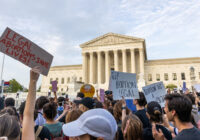Despite the US constitution’s guarantee of free speech, free press and peaceable assembly, public officials habitually retaliate against individuals nationwide for their expression. Officials often decide whether or not to punish based on their political preferences, a practice known as selective enforcement. Unfortunately, examples of it are everywhere.
In 2020, using COVID-19 pandemic restrictions, local governments like the City of New York severely limited the assembly rights of anti-lockdown protesters. Meanwhile, these same local governments supported protesters for the Black Lives Matter (BLM) movement and often allowed them to gather without repercussions. Conversely, in 2021, Florida officials cracked down on BLM protesters but did not arrest disruptors who blocked the Palmetto Expressway in protest for a free Cuba.
Free speech scholar John Inazu found that officials use ordinances to target a wide range of advocates. These include “civil rights workers, antiabortion demonstrators, labor organizers, environmental groups, Tea Party activists, Occupy protesters, and antiwar protesters.”
In an era of divisiveness and polarization, we should be especially concerned about the government using neutral laws to target its perceived political opponents.
Recent cases of selective enforcement
Selective enforcement is often effective at getting its intended result. In 2019, Sylvia Gonzalez was elected the first Hispanic councilwoman for Castle Hills, Texas. She and her supporters responded to constituent feedback by petitioning to remove City Manager Ryan Rapelye. The council held a meeting, after which Mayor Edward Trevino and Chief of Police John Siemens confronted Gonzalez. Perhaps sensing an opportunity to harass a troublesome political opponent, they claimed she had stolen her own petition when she was gathering papers.
After digging through Texas statutes, special detective Alex Wright issued Gonzalez a citation for “intentionally destroy[ing], conceal[ing], remove[ing], or otherwise impair[ing] the verity, legibility, or availability of a governmental record.” Gonzalez was the first to be charged under this statute and circumstance. She was subsequently arrested, jailed and handcuffed to a bench. Her mugshot was splashed across local news.
The punishment worked; Gonzalez stated that she “will never again help organize a petition or participate in any other public expression of her political speech.” The resulting case of Gonzales v. Trevino is ongoing and now pending before the US Supreme Court.
Government harassment over speech can be even more serious. In 2020, Waylon Bailey from Forest Hill, Louisiana made a joke on Facebook about his police department’s overbearing response to the COVID-19 pandemic. In a surprise act of retaliation, numerous deputies led by Detective Randall Iles convened on his home, guns drawn. They arrested Bailey for “terrorizing” in violation of Louisiana law and asked him to “voluntarily” delete the post, to which he complied. The local district attorney dropped the charges. In Bailey v. Iles, a court ruled that Bailey had his free expression rights violated.
The Supreme Court’s possible solution
Officials who selectively enforce speech know some charges will not stick. The point is to silence political speech by weaponizing fear, wasted time and the indignity of an arrest. Harshly punishing one person will ripple outwards, making others hesitate before criticizing authority.
Police officers should have discretion to enforce laws, but there must be sufficient free-speech safeguards. Unfortunately, the Supreme Court eroded much of these protections in 2019. In the case of Nieves v. Bartlett, the Court held the presence of probable cause should trump a claim that the arrest was retaliatory in nature. An exception to this rule applies when someone presents “objective evidence that he was arrested when otherwise similarly situated individuals” were not.
This makes selective enforcement nearly impossible to challenge. Probable cause can be easily met by a determined officer. As Justice Neil Gorsuch explains, “criminal laws have grown so exuberantly and come to cover so much previously innocent conduct that almost anyone can be arrested for something.”
Further, proving that similarly situated individuals were not charged forces one to prove a negative. How can you prove someone was never charged when there are, by definition, no records of that?
The Court will likely give its ruling on Gonzalez v. Trevino this summer. The case provides an opportunity to fix the selective enforcement doctrine. Courts should look to prior precedents and apply a burden-shifting framework in these circumstances. In a concurring opinion for Nieves, Justice Ruth Bader Ginsburg highlighted an excellent path forward, arguing that, if a desire to punish someone for speech is a “motivating factor” for an official’s action, the burden of proof should shift to the government.
Burden-shifting balances the scales of justice. It forces the government to prove it is acting fairly when there is good reason to think officials are targeting speech. It makes it easier for victims like Gonzalez and Bailey to recover. It also causes bad-faith government actors to think twice before pulling these stunts, as they must explain suspicious conduct in court. The Court should seize this chance to help secure free-speech rights against selective enforcement.
[Lee Thompson-Kolar edited this piece.]
The views expressed in this article are the author’s own and do not necessarily reflect Fair Observer’s editorial policy.
Support Fair Observer
We rely on your support for our independence, diversity and quality.
For more than 10 years, Fair Observer has been free, fair and independent. No billionaire owns us, no advertisers control us. We are a reader-supported nonprofit. Unlike many other publications, we keep our content free for readers regardless of where they live or whether they can afford to pay. We have no paywalls and no ads.
In the post-truth era of fake news, echo chambers and filter bubbles, we publish a plurality of perspectives from around the world. Anyone can publish with us, but everyone goes through a rigorous editorial process. So, you get fact-checked, well-reasoned content instead of noise.
We publish 2,500+ voices from 90+ countries. We also conduct education and training programs
on subjects ranging from digital media and journalism to writing and critical thinking. This
doesn’t come cheap. Servers, editors, trainers and web developers cost
money.
Please consider supporting us on a regular basis as a recurring donor or a
sustaining member.
Will you support FO’s journalism?
We rely on your support for our independence, diversity and quality.








Comment